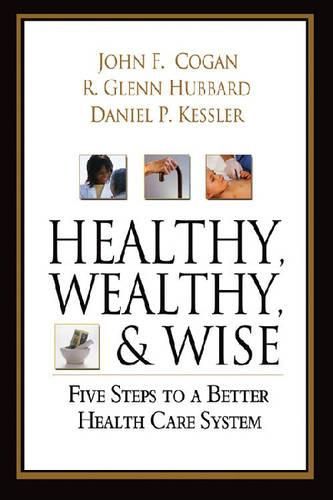Readings Newsletter
Become a Readings Member to make your shopping experience even easier.
Sign in or sign up for free!
You’re not far away from qualifying for FREE standard shipping within Australia
You’ve qualified for FREE standard shipping within Australia
The cart is loading…






The U.S. health care industry has accomplished amazing advances over the past forty years. Dramatic improvements in technology have expanded the length and improved the quality of life. Survey evidence shows that Americans are remarkably satisfied with the quality of health care that they receive. Yet the U.S. health care system has several well-known problems - high costs of care, high rates of uninsurance, and glaring gaps in the quality and efficiency of care - with major consequences for health care and America’s economic well-being. What is the right way to preserve the strengths while addressing the weaknesses of this system? Policymakers, like Americans as a whole, are divided about whether making private markets work better or increasing government involvement is the most appropriate strategy. Supporters of private markets point out that competition and choice provide consumer satisfaction in most markets, so why not health care? Supporters of government’s role argue that high costs and imperfect information give government a natural, direct role in health care financing, if not delivery. In Healthy, Wealthy, and Wise, John F. Cogan, R. Glenn Hubbard, and Daniel P. Kessler argue that the unintended consequences of a handful of public policies are in large part responsible for our system’s problems. These policies have something in common - each of them interferes with, or at best fails to promote, the proper functioning of markets. Cogan, Hubbard, and Kessler believe that the first step to improving our health care system must be reform of these policies, and they map out the path to such reforms. Their patient-centered proposal calls for: health care tax reform to reduce the distorting role of third-party payers in the health care system; insurance reform to foster portable health insurance; legal reforms to improve health care access and quality; better provision of information to providers and consumers; and an explicit public goal to reduce medical errors. The path laid out in Healthy, Wealthy, and Wise shows all concerned citizens that the stakes for successful reform are high, but health reform that delivers the highest value for the resources devoted to health care is achievable through incremental market-oriented reform.
$9.00 standard shipping within Australia
FREE standard shipping within Australia for orders over $100.00
Express & International shipping calculated at checkout
The U.S. health care industry has accomplished amazing advances over the past forty years. Dramatic improvements in technology have expanded the length and improved the quality of life. Survey evidence shows that Americans are remarkably satisfied with the quality of health care that they receive. Yet the U.S. health care system has several well-known problems - high costs of care, high rates of uninsurance, and glaring gaps in the quality and efficiency of care - with major consequences for health care and America’s economic well-being. What is the right way to preserve the strengths while addressing the weaknesses of this system? Policymakers, like Americans as a whole, are divided about whether making private markets work better or increasing government involvement is the most appropriate strategy. Supporters of private markets point out that competition and choice provide consumer satisfaction in most markets, so why not health care? Supporters of government’s role argue that high costs and imperfect information give government a natural, direct role in health care financing, if not delivery. In Healthy, Wealthy, and Wise, John F. Cogan, R. Glenn Hubbard, and Daniel P. Kessler argue that the unintended consequences of a handful of public policies are in large part responsible for our system’s problems. These policies have something in common - each of them interferes with, or at best fails to promote, the proper functioning of markets. Cogan, Hubbard, and Kessler believe that the first step to improving our health care system must be reform of these policies, and they map out the path to such reforms. Their patient-centered proposal calls for: health care tax reform to reduce the distorting role of third-party payers in the health care system; insurance reform to foster portable health insurance; legal reforms to improve health care access and quality; better provision of information to providers and consumers; and an explicit public goal to reduce medical errors. The path laid out in Healthy, Wealthy, and Wise shows all concerned citizens that the stakes for successful reform are high, but health reform that delivers the highest value for the resources devoted to health care is achievable through incremental market-oriented reform.